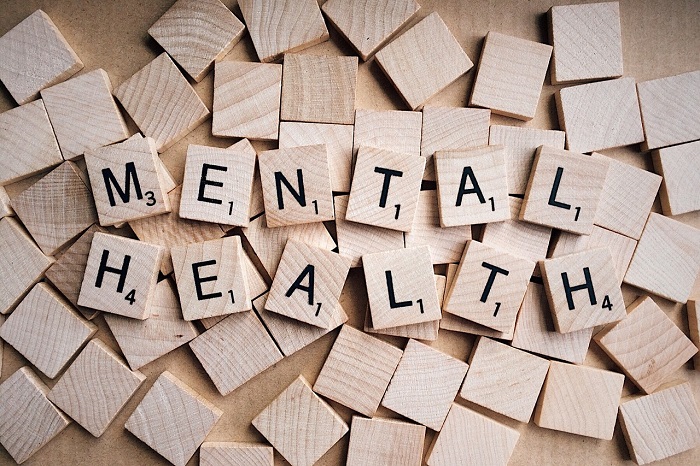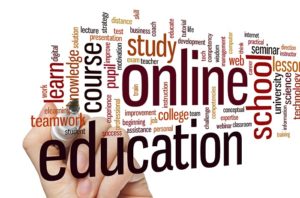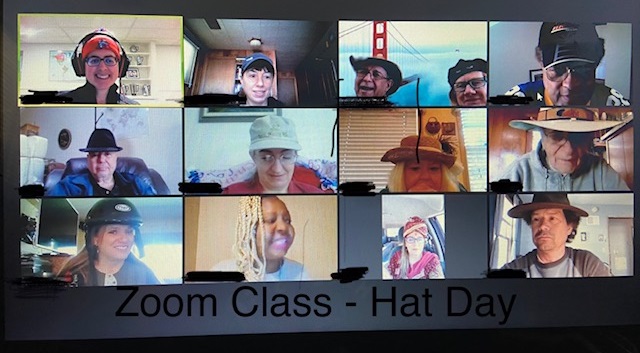- MN ABE Connect
- Archive
- May is Mental Health Month
 May 15, 2020
May 15, 2020
May is Mental Health Month
Wendy Sweeney, MA, LP, PANDA ManagerThis is a good time to check in on how you are managing during the pandemic. Are you suffering from virtual fatigue? Are your moods changing daily? Read on to find strategies on how to manage moods and virtual burnout.
Although we received good news as the Governor has begun to reduce restrictions and end the stay-at-home order, teaching online continues until the end of the school year. There may be a variety of feelings associated with ongoing distance learning and virtual fatigue.
Why are virtual platforms becoming exhausting?
- It requires more mental energy than in-person interactions. When teaching in classrooms you are constantly interacting with several students and at the same time making sure students are understanding information by scanning the class. This can be more challenging virtually.

- During in-person meetings you can be looking down, looking at a co-worker, going to the bathroom or jotting notes, alleviating constant focus.
- Virtually there is more pressure to be responsive and “on”.
- Prolonged eye contact and looking at people’s enlarged faces can cause a subconscious reaction when a face is too close to you. And seeing yourself on video is distracting.
- Nonverbal communication gets lost in virtual meetings.
- The nuance of the give and take in conversations becomes confusing due to the inability to know when someone has stopped talking.
How to alleviate virtual fatigue:
- Set ground rules before the meeting begins.

- Create a structure to the conversation where each person takes a turn speaking and there is an opportunity for a reply. It is okay to call on each person one by one to take turns talking about a topic, which can be much more productive.
- Provide tasks to do during the meeting, such as doing something on paper or thinking about a topic for periods of time.
- Change the view on the online platform so only the person talking is shown on the screen.
- Alternate between different platforms. Try Zoom, Google Meets, GoToTraining, etc.
- Take a break from video platforms by using audio only or making conference calls.
- Take breaks. Often. Between instruction, meetings or just working on the computer in order to refresh and refocus.
Additional coping strategies
Aside from virtual meeting fatigue, you may be having a variety of feelings, such as worry, boredom, depression, sadness, emptiness, guilt, anxiety, and/or anger as the COVID-19 pandemic continues with no definite end in sight. First, your feelings are valid. It is normal to have mixed feelings in response to what is happening in our world. In reaction to these feelings, some people may be using unhealthy coping strategies such as overindulging by eating, drinking or sleeping more than usual.
Some mentally healthy ideas to help include:
- Rather than reaching for unhealthy snacks or a daily glass of wine to release tension, try to replace these habits with something that brings you joy, such as going for a walk, gardening, calling a friend to talk about the day, or starting a project.
- Minimize the amount of unhealthy snacks and alcohol you purchase. Moderation is key!
- Take time to vent! It is mentally healthy to express how you are feeling and what you are thinking, rather than internalizing it. Choose a family member, co-worker, or friend you trust to talk about your feelings and thoughts regularly. If you prefer, journal. When we internalize for long periods, the feelings can come out sideways, such as being irritable, lashing out, and feeling frustrated, anxious or depressed.
- Although it may be difficult, try to keep some semblance of a routine by getting up, starting work, scheduling instruction, taking regular breaks, and ending work at the same time each day.
- Having some structure when you are not working is important also. Try to make a list of activities for your free time and set a goal to accomplish one each day.
- Change your perspective. We are struggling to make sense of the uncertainty and sacrifices we are experiencing. Do not forecast the future. No one has control over what might or might not happen. Focus on what you can control, stay in the present and take one day at a time!
- Look for the slivers of joy! There are good things happening all around you. Think about things you are grateful for each day.
- Try visiting the “Calming Room” developed by the Osseo Area Learning Center. It has various sounds, music, relaxation, and guided practice.
- Please do not hesitate to schedule an appointment with a mental health professional if your moods do not improve. Asking for help is a sign of courage, not weakness. Did you know mental health services are considered essential? Most mental health practitioners are offering counseling via teletherapy or phone call sessions. Some employers also offer Employee Assistance Programs (EAP) which often provide free confidential mental health sessions. (See PANDA resources below).
- Please continue to social distance and wear masks. You are saving lives due to your sacrifices. Thank you for all you are doing!
For more tips on managing stress and resources related to the COVID-19 pandemic, go to PANDA’s website at: https://pandamn.org/mental-health/resources-6/
Back Due to Popular Demand – Mental Health Coffee Break
ABE Teacher Virtual Coffee Break – COVID-19 Mental Wellness for You and Your Students is available for free on Wednesday, May 27 at 2:30 pm. Register here >>
New PANDA Mental Health Course
Just released is a new free recorded webinar titled, “Teaching ABE Students about Mental Health” developed by PANDA consultant and teacher, Colleen Crossley. This course offers instructions and various lesson plans to help guide you on how to teach your students about mental health. The lessons can be taught virtually. Register here >>
Stay healthy and safe everyone! Feel free to email PANDA staff with any concerns or resource needs at [email protected].
Newsletter Signup
Get MN ABE Connect—the official source for ABE events, activities, and resources!
Sign UpArticle Categories
- ABE Foundations/Staff Onboarding
- ACES/Transitions
- Adult Career Pathways
- Assessment
- CCR Standards
- Citizenship
- COVID-19
- Cultural Competency
- Digital Literacy/Northstar
- Disabilities
- Distance Learning/Education
- ELA
- Equity/Inclusion
- ESL
- HSE/Adult Diploma
- Listening
- Math/Numeracy
- Mental Health
- Minnesota ABE
- One-Room Schoolhouse/Multilevel
- Professional Development
- Program Management
- Reading
- Remote Instruction
- Science
- Social Studies
- Speaking/Conversation
- Support Services
- Teaching Strategies
- Technology
- Uncategorized
- Volunteers/Tutors
- Writing